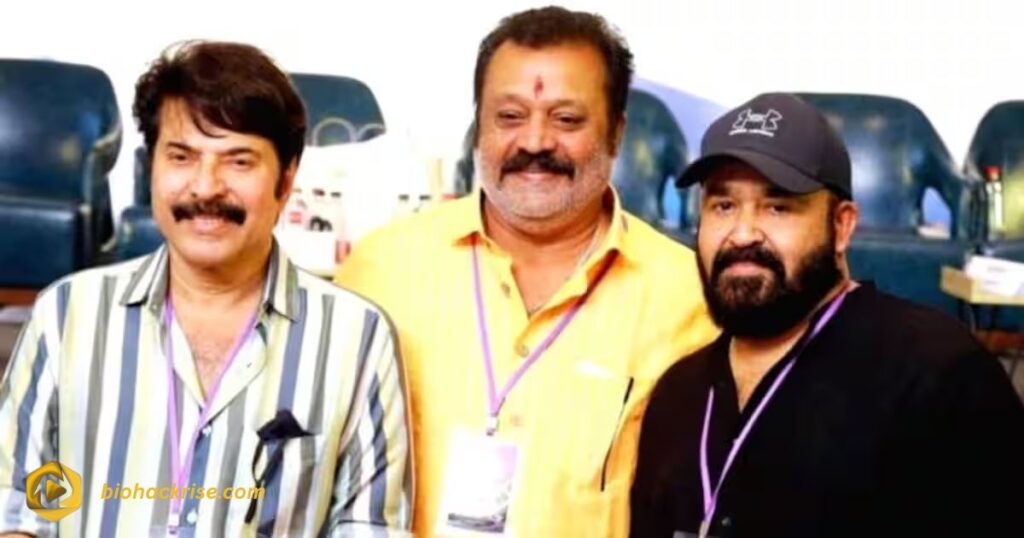What Is the Relationship Between Ben Stace and Suresh Kumar Gondi?
The relationship between Ben Stace and Suresh Kumar Gondi can be defined as a professional and collaborative connection rooted in mutual respect and shared objectives. Their bond is characterized by consistent communication, teamwork and a dedication to common goals.
Both individuals contribute their skills and knowledge to strengthen the partnership. The relationship functions on the principles of trust, accountability, and cooperation.They aim to achieve progress through collaboration rather than competition. This partnership highlights the importance of aligning vision and effort. Their connection can be seen as both supportive and strategic. Overall, the relationship showcases how two individuals can complement one another in meaningful ways.
What Makes the Relationship Between Ben Stace and Suresh Kumar Gondi So Unique?
It’s a story of collaboration, trust and shared success. Their connection goes beyond ordinary teamwork, shaping new opportunities. Each brings value that empowers the other’s journey. Together, they represent a bond built on purpose and growth.
Ben Stace and Suresh Kumar Gondi share a relationship defined by cooperation and mutual goals. They work together in ways that highlight respect and understanding. Their bond is based on professional alignment and shared achievements. Both individuals recognize the strengths each brings to the connection. This relationship reflects trust, collaboration and ongoing support.
A Deeper Look into Ben Stace’s SEO Journey
When analyzing the relationship between Ben Stace and Suresh Kumar Gondi, it’s essential to first explore who Ben Stace is and how his journey in SEO began.
Ben Stace has built a reputation as one of the leading minds in semantic SEO. Unlike traditional SEO experts who focus heavily on keywords, backlinks, and basic on-page optimization, Ben dove deep into entity-based SEO and topical authority. His work often revolves around building topical maps, frameworks that guide website structures around topics and subtopics, helping websites dominate search visibility across an entire niche.
He is closely associated with the teachings and methodologies of Koray Tuğberk Gübür, one of the pioneers of Holistic SEO. Ben not only adopted Koray’s structured frameworks but also added his own strategies, making him a thought leader in the space. His consulting work has impacted numerous businesses, with case studies showing how topical maps and semantic structures can outrank competitors with fewer backlinks, a breakthrough approach compared to traditional SEO practices.
For those new to his work, think of Ben as the architect who draws blueprints for websites. Instead of random keyword stuffing, he builds a structured “city of content” where each page supports another, giving Google clear signals about authority, relevance, and relationships between topics.
A Deeper Look into Suresh Kumar Gondi’s SEO Journey

Now let’s turn the spotlight to Suresh Kumar Gondi, whose background and expertise also contribute to why people associate him with Ben Stace.
Suresh is the Founder of Gondi Media LLP, an SEO agency in India that has worked with global brands, helping them build digital visibility through semantic SEO. His expertise also lies in topical maps, content briefs, and entity optimization, the same cutting-edge approaches that Ben Stace is recognized for.
Where Suresh particularly shines is in practical application. He is widely regarded for his ability to simplify complex semantic SEO structures for businesses that may not have deep technical knowledge. His focus is often on helping businesses move beyond outdated SEO strategies, emphasizing how semantic frameworks can future-proof websites against algorithm updates.
Suresh is also very active in the SEO community. He participates in international masterminds, hackathons, and learning cohorts, where he interacts with other industry leaders, including Ben Stace. On his LinkedIn, he has even shared experiences of meeting “friends like Ben Stace” at such gatherings, showing how their paths do cross in professional communities.
In short, if Ben is the architect drawing city blueprints, Suresh can be seen as the builder who helps businesses construct those cities step by step. Both roles complement each other in theory, even if they aren’t currently partners in practice.
RELATED POST: Xiaoli Cioffi, A Portrait of Leadership and Artistry
The Common Thread: Koray Tuğberk Gübür and Holistic SEO
One cannot talk about the connection between Ben Stace and Suresh Kumar Gondi without mentioning Koray Tuğberk Gübür, the Turkish SEO innovator behind Holistic SEO.
Koray developed a methodology that goes beyond traditional optimization. Instead of simply “ranking for keywords,” his framework focuses on semantic relationships, entity-based SEO, and algorithmic alignment with how Google processes and ranks information. His approach has transformed the careers of many SEO professionals worldwide.
Both Ben and Suresh credit Koray’s teachings for shaping their perspectives. Here’s how:
- Ben Stace: Applied Koray’s methodologies to create practical frameworks for topical mapping that businesses can implement at scale. His strategies emphasize predictability and repeatability of SEO success.
- Suresh Kumar Gondi: Leveraged Koray’s system to help brands in India and globally adapt semantic SEO into their marketing ecosystems. He’s also part of hackathons and mastermind groups where Koray’s ideas are tested and discussed.
Thus, while Ben and Suresh don’t appear to collaborate directly, their shared mentor creates an indirect professional bond. They are both part of a global network of semantic SEO experts who constantly refine, share and apply these advanced frameworks in real-world scenarios.
Why People Associate Ben Stace and Suresh Kumar Gondi
At this point, you might wonder: Why do so many people ask about their relationship if they aren’t formal partners?
Here are some clear reasons:
- Similar Expertise: Both specialize in semantic SEO, a relatively narrow but rapidly growing field. Naturally, anyone searching for experts in this domain will find both names appearing together.
- Community Presence: They are active in the same LinkedIn circles, mastermind groups and SEO events, which creates frequent overlaps in visibility.
- Expert Round-Ups: Both often feature in “Top 10 Semantic SEO Experts” lists. Seeing their names side by side leads people to assume closer ties.
- Shared Mentorship: As mentioned, their link to Koray Tuğberk Gübür cements them as part of the same intellectual lineage in SEO.
- Networking References: Posts from Suresh acknowledging Ben at events (and vice versa through mutual community members) reinforce the perception of a connection.
In essence, people associate them not because of confirmed business partnerships, but because their paths consistently converge in the semantic SEO ecosystem.
Are They Business Partners?
The short and simple answer: No, there is no verified evidence that Ben Stace and Suresh Kumar Gondi are business partners.
Here’s what we know:
- Ben Stace operates independently as a consultant, strategist, and thought leader.
- Suresh Kumar Gondi runs Gondi Media LLP as his own firm.
- No joint agency, co-founded company, or shared ownership has been documented.
- They have not co-authored white papers, SEO tools or formalized training programs together.
So while they are professional peers, they are not business collaborators, at least not as of now.
How Their Paths Intersect in the SEO Community
Although Ben Stace and Suresh Kumar Gondi are not confirmed business partners, their professional paths intersect frequently in online and offline SEO spaces. This repeated intersection is one of the main reasons people often assume they have a stronger professional bond.
- Online Communities
Both are highly active on platforms like LinkedIn, Twitter (X), and SEO-specific forums, where discussions on topical authority, entity-based SEO, and advanced content strategies take place. They engage with the same audiences, comment on similar posts, and often appear in community mentions together. - Global SEO Round-Ups
Various industry websites, blogs, and magazines list them in “Top Semantic SEO Experts” features. Being showcased side by side repeatedly strengthens the perception of a professional relationship. - Masterminds & Hackathons
Both have been part of mastermind groups and hackathons in the semantic SEO ecosystem. For instance, Suresh has publicly shared posts about meeting “friends like Ben Stace” at such gatherings. This shows that while they may not run a business together, they exchange ideas and share space in learning communities. - Shared Networks
Their connection to Koray Tuğberk Gübür and the broader Holistic SEO network naturally puts them in overlapping professional circles. This creates organic intersections, much like alumni from the same university bumping into each other in different industries.
It’s important to note that this is not unusual in niche industries. In fact, in specialized fields like semantic SEO, the top 20–30 global names are bound to cross paths regularly, through events, research, and mentorship circles.
Comparing Their Approaches to Semantic SEO
Although both experts specialize in semantic SEO, their approaches carry unique distinctions that make them complementary rather than identical. Let’s break down how they compare.
1. Strategy Focus
- Ben Stace: Known for topical maps, content clusters, and entity-focused frameworks. His style is very structured, making him ideal for businesses that want predictable, repeatable results.
- Suresh Kumar Gondi: Focuses on practical execution of semantic strategies for businesses. His approach emphasizes making semantic SEO accessible to clients who may not fully grasp the technicalities.
2. Audience
- Ben: Works closely with Western markets, particularly Europe and North America.
- Suresh: Has a strong India-first presence, while also catering to global clients who want affordable but advanced SEO strategies.
3. Community Role
- Ben: Often regarded as a framework builder, a strategist who creates models others can apply.
- Suresh: Seen as a translator of theory into practice, someone who teaches and guides businesses to implement these strategies effectively.
4. Recognition
- Both are regularly recognized by peers, round-ups, and community leaders. However, their reputations stem from slightly different strengths—Ben for strategy innovation and Suresh for execution excellence.
This comparison shows why their names get linked so often: they represent two sides of the same coin in semantic SEO.
Why the Public is Curious About Their Relationship?
The frequent curiosity about whether Ben Stace and Suresh Kumar Gondi are connected is not accidental, it’s the result of how they’re positioned in the SEO ecosystem. Here are the main drivers of this curiosity:
- Scarcity of Semantic SEO Experts
Semantic SEO is still an emerging specialization. Compared to traditional SEO, only a handful of experts worldwide dominate this field. Because Ben and Suresh are both on that shortlist, people naturally assume a connection. - Repeated Mentions Together
When industry round-ups, blog posts, or LinkedIn updates consistently mention them together, it plants the seed of a possible partnership in the public’s mind. - Human Tendency to Seek Networks
People love connecting the dots. When two experts share the same mentor (Koray Tuğberk Gübür), appear in the same communities, and talk about the same concepts, it’s natural to assume they must collaborate behind the scenes. - SEO’s Competitive Nature
In SEO, thought leadership matters. Followers, clients, and learners often want to know who is “teaming up with who” because partnerships can create powerful synergies in knowledge-sharing.
In short, the curiosity isn’t just gossip, it’s rooted in the importance of collaboration and association in professional branding.
How Their Relationship Impacts the SEO Industry
Even without a formal partnership, the indirect relationship between Ben Stace and Suresh Kumar Gondi has ripple effects in the SEO industry:
- Raising Awareness of Semantic SEO
Both amplify the visibility of semantic SEO. By consistently publishing, sharing, and discussing advanced methods, they help move the entire industry beyond outdated keyword-first models. - Building Global Bridges
Ben’s prominence in Europe and Suresh’s base in India create a cross-continental awareness of semantic SEO. Their parallel influence introduces businesses across different geographies to the same principles. - Community Strengthening
By being part of the same masterminds and knowledge-sharing events, they strengthen the collective expertise of the community. This impacts not just them but every SEO professional learning from these spaces. - Legitimizing New Practices
The fact that two experts independently apply and advocate for similar strategies reinforces credibility. It signals to businesses that semantic SEO isn’t just a “passing fad” but a legitimate, proven methodology.
Thus, even without working hand-in-hand, their combined influence pushes semantic SEO forward at a global scale.
Potential for Future Collaboration

While there’s no solid evidence of direct collaboration today, the possibility of Ben Stace and Suresh Kumar Gondi working together in the future is not far-fetched.
Here’s why collaboration could be a natural fit:
- Complementary Strengths
Ben’s strategy-driven mindset and Suresh’s practical execution style could make for a powerhouse partnership. One could design the frameworks, while the other brings them to life for clients. - Global Presence
Ben’s influence in Europe and Suresh’s base in India would provide a truly international reach for any joint project. - Community Expectation
Since their names already appear together so often, a collaboration would feel natural to the SEO community. It would also generate significant attention and engagement. - Shared Mentor & Methodology
With both being influenced by Koray Tuğberk Gübür, a joint project would align smoothly, since their foundational principles are already in sync.
Possible collaboration formats include:
- Co-hosted webinars on semantic SEO.
- A joint white paper or guidebook on topical maps.
- Partnering in SEO hackathons as co-mentors.
- Launching a SaaS tool designed around entity-based SEO.
If such a collaboration happens, it could be a milestone event in the SEO world, combining two powerful voices into one platform.
SEO Lessons from Ben Stace and Suresh Kumar Gondi
Whether or not they directly collaborate, there are valuable SEO lessons to learn from both experts. By studying their approaches, professionals and businesses can gain a roadmap to success in the era of semantic SEO.
1. Build Topical Authority, Not Just Keywords
Both Ben and Suresh emphasize that keywords alone are not enough. Google now ranks websites based on topic depth and semantic connections. Building topical maps ensures your site covers a subject comprehensively.
2. Focus on Entities and Context
Instead of obsessing over keyword density, focus on entities (people, places, organizations, concepts) and the relationships between them. This creates content Google understands better, improving rankings.
3. Adopt a Long-Term SEO Mindset
Quick hacks and loopholes don’t last. Both experts advocate for sustainable SEO strategies rooted in semantic relevance and structured data. These withstand algorithm updates far better than old-school tactics.
4. Join Knowledge-Sharing Communities
Both Ben and Suresh are active in masterminds, hackathons, and SEO networks. This shows the importance of learning from peers, sharing insights, and keeping up with industry changes.
5. Balance Theory with Execution
Ben often represents the theoretical strategist (building frameworks), while Suresh represents the practical executor (applying them). The lesson: SEO success requires both, big-picture thinking and tactical execution.
By applying these takeaways, businesses can start adopting semantic-first SEO strategies today, even without directly working with these two experts.
The Role of Mentorship and Networks in SEO Growth
The connection between Ben Stace and Suresh Kumar Gondi highlights how mentorship and networks shape SEO careers.
- Shared Mentor (Koray Tuğberk Gübür): Both credit Koray’s holistic SEO methodology for shaping their expertise. This mentorship serves as a bridge between them.
- Global Networks: They participate in international communities, meaning they benefit from knowledge that crosses geographical and cultural boundaries.
- Peer Learning: By engaging with peers in masterminds, they keep pushing the boundaries of SEO innovation.
This underlines a powerful truth: in SEO, your network is as important as your knowledge. Staying isolated risks falling behind, while being connected ensures constant evolution.
Debunking Misconceptions About Their Relationship
Because their names appear together so often, rumors and misconceptions arise. Let’s clear them up:
- Are they co-founders of an agency?
No. Ben works independently, and Suresh runs Gondi Media LLP. - Do they produce tools or software together?
No evidence suggests they’ve co-developed a tool or SaaS product. - Do they teach courses as a team?
While both are educators in their own right, no joint course exists. - Are they business partners?
No. Their relationship is best described as professional peers within the same community. - Do they influence each other’s strategies?
Indirectly, yes since both are guided by Koray Tuğberk Gübür’s frameworks and contribute to similar communities.
Understanding these misconceptions helps the public view their relationship accurately, based on shared influence, not direct partnership.
The Bigger Picture: What This Means for SEO Learners
For SEO learners and businesses, the curiosity around Ben and Suresh’s relationship offers a teachable moment. It shows how thought leaders within the same niche naturally get linked—not because of official partnerships, but because of shared expertise and community ties.
- If you’re learning SEO, don’t just focus on who is working with whom, focus on what strategies they teach and how they apply them.
- If you’re a business, it doesn’t matter whether Ben and Suresh are partners. What matters is adopting the semantic SEO practices that both advocate.
- If you’re an aspiring SEO professional, this is a reminder that being active in communities, sharing insights, and following mentors will naturally lead to recognition and connections.
In other words, the real takeaway isn’t about their personal relationship, it’s about the methodologies they champion and how you can implement them.
FAQ’s
Are Ben Stace and Suresh Kumar Gondi close friends?
They have interacted professionally in communities and events but are not known to be close personal friends.
Will they ever collaborate officially?
It’s possible. Their complementary strengths make collaboration a natural fit in the future.
Why do they always appear in “Top SEO Experts” lists together?
Because both are recognized leaders in semantic SEO, a niche with only a handful of global specialists.
Can businesses work with both at the same time?
Yes, but separately. Each runs their own consulting practice/agency. There’s no joint service package.
What’s the best way to learn their methods?
Follow their LinkedIn updates, join semantic SEO communities, and study Koray Tuğberk Gübür’s frameworks—since both derive their methods from his teachings.
Conclusion
After analyzing all available information, here’s the conclusion:
- Ben Stace and Suresh Kumar Gondi are not business partners or direct collaborators.
- Their relationship is professional and indirect, based on shared communities, mentorship from Koray Tuğberk Gübür and a common focus on semantic SEO.
- They are often mentioned together because they represent two major voices in the same specialized field, Ben as a strategist and Suresh as a practitioner.
- Even without direct collaboration, their combined influence is helping push the global SEO industry toward semantic, entity-driven practices.
So, while the public’s curiosity about their connection is understandable, the truth is simple: they are respected peers, not partners. And perhaps, the most exciting part is the potential for future collaboration, which could shape the next chapter of semantic SEO.




